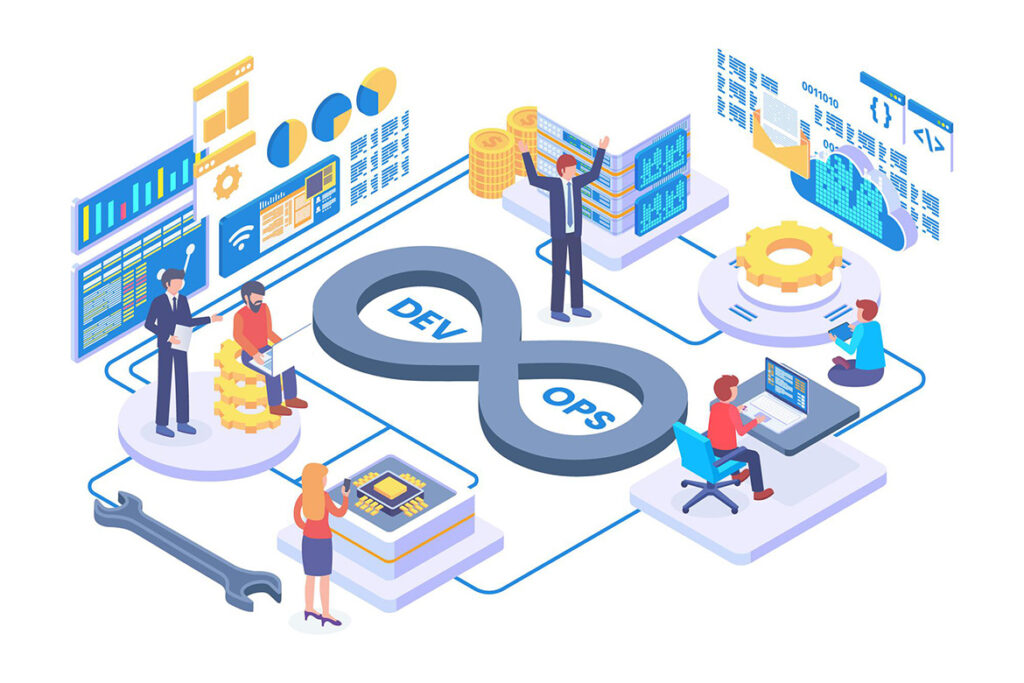Future of DevOps in the financial services sector
According to Gartner, DevOps is revolutionizing financial services by improving software delivery’s speed, quality, and security. It has been a game-changer for the financial industry, allowing companies to adapt to market changes and customer needs quickly while maintaining regulatory compliance. By integrating development and operations teams, financial services firms can streamline their software development lifecycle and reduce the time to market for new products and services. It has also helped financial institutions to automate and optimize their infrastructure and application management, leading to increased efficiency and cost savings. DevOps has become a critical component of digital transformation in the financial sector, enabling organizations to innovate and compete in an ever-evolving landscape.

Importance of DevOps
DevOps encompasses a range of cultural and managerial practices to promote cooperation between software development and IT operations teams. Effective coordination among groups and stakeholders is crucial with the growing reliance on third-party services and tools to hasten product delivery and improve quality. As such, it requires the alignment of goals and objectives and the engagement of all relevant departments to meet complex and evolving requirements.
This aims to create a collaborative environment where development, operations, and quality assurance teams share responsibility and accountability. This involves implementing Agile practices, including pair programming and continuous integration, to improve communication. It also focuses on continuous improvement by optimizing data collection, analysis, and sharing. The goal is to produce a culture of trust and transparency where everyone can openly communicate issues and concerns without fear of negative consequences.
Advantages
Reduced time of production:
DevOps is a crucial aspect of any organization, enabling them to enhance their software development processes by implementing improved procedures, automation, and effective release planning. This, in turn, enables organizations to release their products faster, giving them an edge over their competitors. By reducing the time to market, companies can respond more to changing customer needs and preferences.
Quicker innovation:
DevOps provides several advantages, and one of them is facilitating faster innovation. By delivering products to the market more quickly, companies can outpace their competitors in innovation. This culture promotes collaboration and communication among team members, enabling them to exchange innovative ideas and thoughts in real-time freely.
Increased efficiency:
DevOps minimizes the need for software engineers to handle tasks that can be automated manually. Utilizing parallel workflows, acceleration tools, scalable infrastructure, and continuous integration servers, and more significantly reduces the amount of manual labor required for efficient software development and deployment.
Advanced reliability:
DevOps leads to more dependable development, deployment, and other processes that are less prone to errors. By utilizing it and continuous testing, the team can rapidly recognize any inconsistencies or problems in the software, resulting in faster development cycles. Effective communication and knowledge sharing make it easy to address issues promptly. Additionally, it provides the ability to undo a deployment quickly at any point in the process.
Future of DevOps
While the specific technologies and methods used in DevOps may evolve, the fundamental principles of the approach will endure. At its core, DevOps fosters the creation of IT teams that are more adaptable, responsive, and aligned with broader business objectives. Artificial intelligence and machine learning can automate routine IT tasks, freeing teams to focus on strategic initiatives. DevOps technologies encompass a range of cutting-edge tools such as big data, machine learning, and automation.
While the concept of DevOps may seem abstract, its benefits are tangible. Cost reductions of over 30% can be achieved by utilizing IT resources more effectively. Additionally, the time required for deployment is significantly reduced, enabling employees to take advantage of more innovative solutions in less time. Adopting DevOps can be a significant differentiator in a business environment where success is often determined by how quickly new products are released. For more insightful blogs, visit auxin.io






